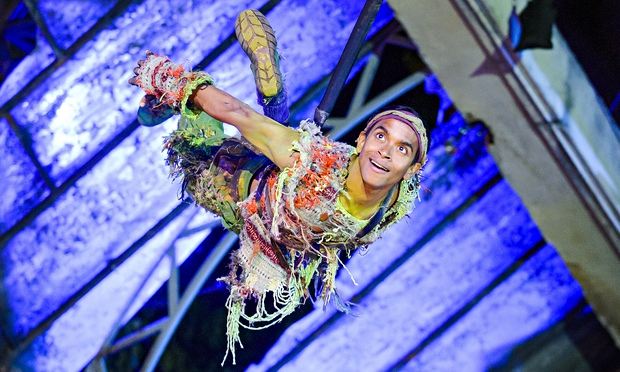 I’ve been cramming the diary even fuller than usual, if that’s possible, over the last week, even allowing for the fact that I actually allowed myself a day off yesterday (imagine!), paying a social trip to have lunch with friends in Bath — and even resisting the temptation to see The Mother at the Ustinov studio, even though it had both a matinee and an evening performance I could have popped into see.
I’ve been cramming the diary even fuller than usual, if that’s possible, over the last week, even allowing for the fact that I actually allowed myself a day off yesterday (imagine!), paying a social trip to have lunch with friends in Bath — and even resisting the temptation to see The Mother at the Ustinov studio, even though it had both a matinee and an evening performance I could have popped into see.
So perhaps I’m slowing down a bit. But it certainly didn’t feel like it last Monday, when I landed from New York at 7.30am and wrote up a column published on The Stage website that day on the results of this year’s Tony Awards before I even left the airport. I had got myself upgraded (using mileage, I hasten to add) to Virgin Upper Class for my return leg, only so that I could use the Virgin Revivals lounge on arrival (but no paying tribute to the previous night’s Tony winner The King and I, despite its name).
And then I headed directly to Osterley, home of Sky News, to do a live TV interview on this year’s Tony results, and particularly the great run of British wins for shows that included the National’s Curious Incident of the Dog in the Night-time (Best Play, Best Actor, Best Director, Best Scenic Design, Best Lighting), The Audience (Best Actress, Best Featured Actor), Skylight (Best Play Revival) and Wolf Hall (best costumes).
From Osterley it was direct to ArtsEd in Chiswick (both of them handily on a direct route from Heathrow) for my weekly triplicate teaching sessions with the first year Musical Theatre students, for whom this week’s class for the first two groups was devoted to the musicals of Boublil and Schönberg. 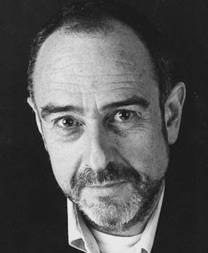 The third group, however, got an extra bonus: they came with me to Southwark for an interview I was conducting with Claude-Michel Schönberg himself (pictured left) at Jerwood Space, at the end of a day laid on by Mercury Musical Developments for its aspiring musical writers to work with the master himself.
The third group, however, got an extra bonus: they came with me to Southwark for an interview I was conducting with Claude-Michel Schönberg himself (pictured left) at Jerwood Space, at the end of a day laid on by Mercury Musical Developments for its aspiring musical writers to work with the master himself.
He was quietly inspirational about sticking to your guns in trying to write musicals of your dreams, and also revealingly honest about the ‘borrowings’ that musicians typically make from each other and openly acknowledged the ones he’d made in Miss Saigon.
My day wasn’t done yet — from Jerwood I finally made it home to drop off my travel bag and then head to Southwark Playhouse for the first night of Teddy, which I was reviewing for The Stage here. Fortunately, just as Osterley and ArtsEd were in a direct route from Heathrow, so Jerwood Space and Southwark Playhouse are neatly positioned about equidistant from my home in a five minute walk either direction, so at least I didn’t have far to go!
I spent a lot of time at ArtsEd this week — as well as my Monday teaching session, I also teach there on Thursday, this time to the first year acting students, and for this week’s session I brought in young playwright Diana Atuona to talk to them. They had all seen her debut play Liberian Girl at the Royal Court’s Theatre Upstairs, mainly because one of the third year ArtsEd acting students had been in it — Juma Sharkah, who was subsequently shortlisted for an Olivier Award in the ‘Outstanding Achievement in an Affiliate Theatre’ category.
And on Friday I was back at ArtsEd to see the final show of the 3rd year Musical Theatre students, Defect — the world premiere of a show, developed by new musical organisation Perfect Pitch, by Craig Adams and Clare Prenton, that brilliantly saw them engaging and wrestling with an atmospherically weird ‘West Side Story’ like story of love across a divide of genetic mutations.
I have watched this year’s 3rd years — some 32 of whom were represented here — grow across their time there, and it been amazing to watch many of them already migrating into the profession for real. I’ve already seen some of them in Carrie at Southwark Playhouse and Sweeney Todd at The London Coliseum. Some more of those missing from the line-up here are already in Mamma Mia!, Les Miserables and High Society in the West End; another is in A Damsel in Distress in Distress at Chichester; others are now in the tours of Love Me Tender and Shrek.
This is an incredible track record for one school’s graduating class, and although I’m obviously not unbiased here, there were no defects, at least from the training and performance point of view, in Defect.
 Sam O’Rourke (left), who played the lead in Defect at the performance I saw, is already lined up for two jobs: a lead in the Open Air Regent’s Park production of 7 Brides for 7 Brothers, then a tour of the new musical The Smallest Show on Earth, featuring an Irving Berlin score. I last saw him in the lead of the ArtsEd production of Crazy for You, when he proved his worth as an outstanding comic actor, singer and dancer: a true triple threat. He’s going places, and fast.
Sam O’Rourke (left), who played the lead in Defect at the performance I saw, is already lined up for two jobs: a lead in the Open Air Regent’s Park production of 7 Brides for 7 Brothers, then a tour of the new musical The Smallest Show on Earth, featuring an Irving Berlin score. I last saw him in the lead of the ArtsEd production of Crazy for You, when he proved his worth as an outstanding comic actor, singer and dancer: a true triple threat. He’s going places, and fast.
This week also saw me at Chichester for the opening of A Damsel in Distress (whose cast contained another graduating ArtsEd third year Mairi Barclay), the latest ‘new’ Gershwin musical following in the footsteps (not to mention dance steps) of My One and Only, the aforementioned Crazy for You, Nice Work if You Can Get it, and the current Broadway hit An American in Paris. The Gershwins’ wrote great songs — some of the greatest, in fact, in the history of Broadway — but few of their shows, outside of Porgy and Bess, are truly revivable. The fashion for making ‘revisals’ out of old properties is a brilliant way of making their songs theatrically viable again, and A Damsel in Distress is another expertly joyful, irresistibly silly addition to the repertoire. I reviewed it for The Stage here.
The Chichester opening clashed with the London premiere of Patrick Marber’s latest The Red Lion at the National, so I didn’t catch that till Thursday night (and reviewed it here). I was also out of synch with Waiting for Godot, briefly imported to the Barbican from Sydney Theatre Company, which opened last Friday when I was in New York so I caught up with on Tuesday and which again I had a personal investment in — Pozzo was being played by my good friend Philip Quast, and it was great to have him back on the London stage, for the second time this year (he was also Judge Turpin in the ENO Sweeney Todd), since his return to his native Australia three years ago.
I’m continuing to play catch-up today, with a double bill later of the National’s The Beaux Stratagem this afternoon and the Open Air Theatre’s Peter Pan tonight — as I couldn’t make the first night of the latter, I’m making the last night instead! Truly a case of better late than never. But I’m checking the weather forecasts hourly as a result…..
Across the eight days and nights between last Sunday and tonight, I’ll have seen 11 shows, and (excepting tonight which I’ve not seen yet and one of which was a critics’ preview and I’m therefore not in a position to comment publicly on yet), I’ve loved eight out of the nine.
That’s an incredible strike record for one week, and one of those runs of great shows that you only dream of. It helps, of course, that I was playing catch up on six of them, so I was in (comparatively) safer hands than going blind to yet-to-be reviewed shows. But there’s also a fear that a show won’t live up to the good reviews youv’e already read and absorbed.
This week, however, each and every show that I can comment on publicly delivered (bar one, about which more in a moment). The range was astonishing: old plays boldly reinvented, brand new plays that are respectively thrillingly alive to recent modern events or spoke to me personally.
The revivals were JM Barrie’s Peter Pan and Farquhar’s The Beaux’ Stratagem, respectively from the start of the 20th century and the 18th century, given delightful new expression at the Open Air Theatre in Regent’s Park (pictured below) and the National’s Olivier respectively. 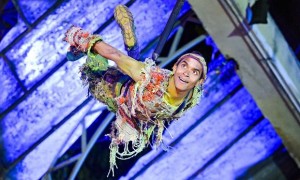 I’ve seen the Peter Pan story retold many times in the theatre over the years — most recently, on Broadway in the musical Finding Neverland, which tells the back story of how JM Barrie came to write it — but only once before as well as I saw it done on a fairly chilly but at least mercifully dry evening in Regent’s Park.
I’ve seen the Peter Pan story retold many times in the theatre over the years — most recently, on Broadway in the musical Finding Neverland, which tells the back story of how JM Barrie came to write it — but only once before as well as I saw it done on a fairly chilly but at least mercifully dry evening in Regent’s Park.
The previous occasion was the famous Trevor Nunn/John Caird reinvention of the 80s, originally staged by the RSC at the Barbican with Mark Rylance in the title role, which was subsequently restaged at the National in 1997 by Caird alone, with Ian McKellen as Captain Hook; surely one of the few shows that’s been staged in the same version by the same director for both companies!
Here, co-directors Tim Sheader and Liam Steel — who’ve worked together often before, as Nunn and Caird had also done —illuminate the play with both a resonant back story (it’s being told to World War One soldiers recovering in hospital from their injuries) and a vibrant new kind of physicality, that renders the famous flying that Peter Pan, Wendy and her brothers do on a series of very visible, but incredibly agile, bungee ropes. I couldn’t help think that Spider-Man: Turn off the Dark could have saved itself about £69m of its reported budget if it had come up with a solution for the flying as simple and yet effective as this.
As for The Beaux’ Stratagem, I’m usually allergic to restoration comedies, but director Simon Godwin brings it alive with real comic vigour thanks to some really funny performances from actors that include the wonderful Samuel Barnett and Geoffrey Streatfeild. This is the National Theatre at its best, offering a rare sighting of a classic play that comes up completely fresh, with great actors at the top of their game.
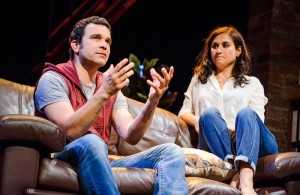 The National was also responsible for this week’s UK premiere of The Motherfucker with the Hat (left), which I reviewed for The Stage here. I saw this play’s Broadway premiere in 2011, but this play about confronting addictions with the help of a 12-step programme struck me with a lot more force than first time around. And that’s where this blog gets (a lot!) more personal: over the last year I have joined a 12-step fellowship myself, and I’m not ashamed to say it has turned my life around. The play uses the language of 12 steps – complete with mentions of sponsors, slips and Higher Powers — to tell an alternately ferocious and comic story of betrayal and loss with real insight.
The National was also responsible for this week’s UK premiere of The Motherfucker with the Hat (left), which I reviewed for The Stage here. I saw this play’s Broadway premiere in 2011, but this play about confronting addictions with the help of a 12-step programme struck me with a lot more force than first time around. And that’s where this blog gets (a lot!) more personal: over the last year I have joined a 12-step fellowship myself, and I’m not ashamed to say it has turned my life around. The play uses the language of 12 steps – complete with mentions of sponsors, slips and Higher Powers — to tell an alternately ferocious and comic story of betrayal and loss with real insight.
As so often (regrettably), my colleague Christopher Hart in the Sunday Times barks up the wrong tree entirely to call the play’s potential admirers (and I’m far from alone in being one) out for giving the play an easy pass, as he claims much black theatre is, by quoting from this specious diatribe: “Constrained by the culture of political correctness, critics dare not challenge these works for their palpable lack of artistic merit, for fear of being deemed racist. Instead, they are left no choice but to praise the peerless authenticity of the urban dialogue, or similar, to the hilt.” (We are, however, given no examples of the sort of work being complained of, to test those assumptions against).
Though Motherfucker isn’t black or British, he uses that argument to suggest that we’re not being entirely honest in our admiration of it, and writes: (behind a paywall)
Here we are at the National, watching this turgid tripe, uninspiringly directed by the artistic lead at the state-subsidised Tricycle, Indhu Rubasingham. And none of the impeccably polite, almost entirely white English audience dares to say what a pile of steaming offal it is.
It’s an astonishing review, loaded in its own assumptions, none of it supported by any evidence beyond blind prejudice. But then Hart has past form on making these kind of loaded connections; as I wrote previously here, he has twice used reviews to suggest that gays and sexual fetishists have only got themselves to blame for the Nazis and where they took them in Cabaret and Bent.
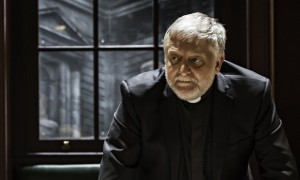 I had five more great nights (or rather three great nights and two great afternoons!) at the theatre this week. I finally caught up, too, with Steve Thompson’s Temple at the Donmar Warehouse, an imagined version of what went on behind the scenes in the office of the Dean of St Paul’s Cathedral in 2011 during the Occupy protests of its grounds that shut the cathedral to the public as even the Nazis hadn’t managed to do. Once again, Simon Russell Beale (above) proves what an astonishing actor he is as the Dean; he has a chameleon-like ability to shed his own skin and take on someone else’s entirely, totally inhabiting a role as if from within even though he physically still looks the same. And he’s matched in glory here by the always estimable Malcolm Sinclair, who as the Bishop has a wonderfully testy encounter with him that is full of drama and passion.
I had five more great nights (or rather three great nights and two great afternoons!) at the theatre this week. I finally caught up, too, with Steve Thompson’s Temple at the Donmar Warehouse, an imagined version of what went on behind the scenes in the office of the Dean of St Paul’s Cathedral in 2011 during the Occupy protests of its grounds that shut the cathedral to the public as even the Nazis hadn’t managed to do. Once again, Simon Russell Beale (above) proves what an astonishing actor he is as the Dean; he has a chameleon-like ability to shed his own skin and take on someone else’s entirely, totally inhabiting a role as if from within even though he physically still looks the same. And he’s matched in glory here by the always estimable Malcolm Sinclair, who as the Bishop has a wonderfully testy encounter with him that is full of drama and passion.
Two more great outings were both directed (or co-directed) by Robert Icke. The first was the return of his 2013 production of 1984, co-directed and co-adapted with Duncan Macmillan, that previously played at the Almeida and then transferred to the Playhouse and is now back there again. (My review for The Stage is here) The second was Icke’s new production of Oresteia, again at the Almeida, which launches the theatre’s three play Greek season. 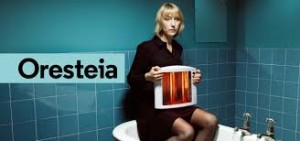 This is a demanding, sometimes gruelling evening — it runs for nearly four hours, including two short intervals that are timed to the minute (and wouldn’t it be a good idea if all intervals ran according to a countdown clock so you knew that they’d be getting on with it, rather than on first nights where the momentum of a show is often fatally lost by intervals that can stretch to 25 or 30 minutes)? But it made me think that I was truly watching the future of the theatre right there — like the early work of Katie Mitchell, Richard Jones, Sacha Wares, Robert Lepage or Ivo van Hove, I felt like I was watching a director creating his own new storytelling language for the first time.
This is a demanding, sometimes gruelling evening — it runs for nearly four hours, including two short intervals that are timed to the minute (and wouldn’t it be a good idea if all intervals ran according to a countdown clock so you knew that they’d be getting on with it, rather than on first nights where the momentum of a show is often fatally lost by intervals that can stretch to 25 or 30 minutes)? But it made me think that I was truly watching the future of the theatre right there — like the early work of Katie Mitchell, Richard Jones, Sacha Wares, Robert Lepage or Ivo van Hove, I felt like I was watching a director creating his own new storytelling language for the first time.
From a brand-new emerging voice to two veteran ones, my theatregoing set was completed by catching the London transfer of director Max Stafford-Clark’s latest Out of Joint tour of Crouch, Touch, Pause, Engage to the Arcola, a wonderful verbatim play about the former Welsh rugby captain Gareth Thomas and his long journey towards self and public acceptance when he came out as gay; 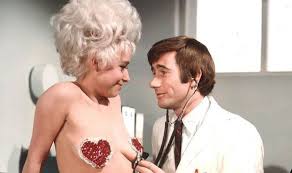 and the London return of Jim Dale — 50 years after he made his West End debut on the self-same Vaudeville stage — in a spirited solo retrospective of his career that has stretched from the music halls to Carry On (left, in a scene with Barbara Windsor) and from Olivier’s National to Broadway.
and the London return of Jim Dale — 50 years after he made his West End debut on the self-same Vaudeville stage — in a spirited solo retrospective of his career that has stretched from the music halls to Carry On (left, in a scene with Barbara Windsor) and from Olivier’s National to Broadway.
Both of these are inspiring stories, beautifully told. And I seriously loved both. The one show I’m afraid that created the only blip in this horizon of excellence was a pedestrian nostalgic trawl through the back catalogue of one singer’s past repertoire: Judy – the Songbook of Judy Garland (a touring show which I reviewed in Wimbledon for The Stage here) brought Garland’s younger daughter Lorna Luft to join a UK ensemble to sing some of her songs and provide a direct link to her, but it was both tired and tiring to watch.
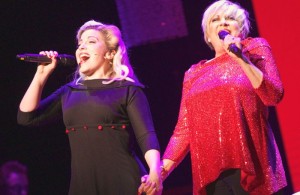 Luft (pictured left with Louise Dearman) has spent much of her career revisiting her own mother’s past, last appearing in the West End in a solo run of her show ‘Songs My Mother Taught Me’ at the Savoy Theatre, which one wag famously re-dubbed as ‘Songs My Mother Taught My Sister While I was in the room.’ But that show produced one of my favourite of all critical put-downers; referring to the fact that she wore a shoulder-less dress in the second act, the critic for Time Out said it was “presumably to reveal the absence of a chip.”
Luft (pictured left with Louise Dearman) has spent much of her career revisiting her own mother’s past, last appearing in the West End in a solo run of her show ‘Songs My Mother Taught Me’ at the Savoy Theatre, which one wag famously re-dubbed as ‘Songs My Mother Taught My Sister While I was in the room.’ But that show produced one of my favourite of all critical put-downers; referring to the fact that she wore a shoulder-less dress in the second act, the critic for Time Out said it was “presumably to reveal the absence of a chip.”
Luft was also once responsible for one of the most extraordinarily embarrassing cabaret nights I’ve ever witnessed when she appeared at Pizza on the Park. She sang her first set, took a break and returned for a second. Somehow, she hadn’t realised that it was the same audience who would be present for both halves; so we simply got a word-for-word and song-for-song reprise of the show we’d just seen.

